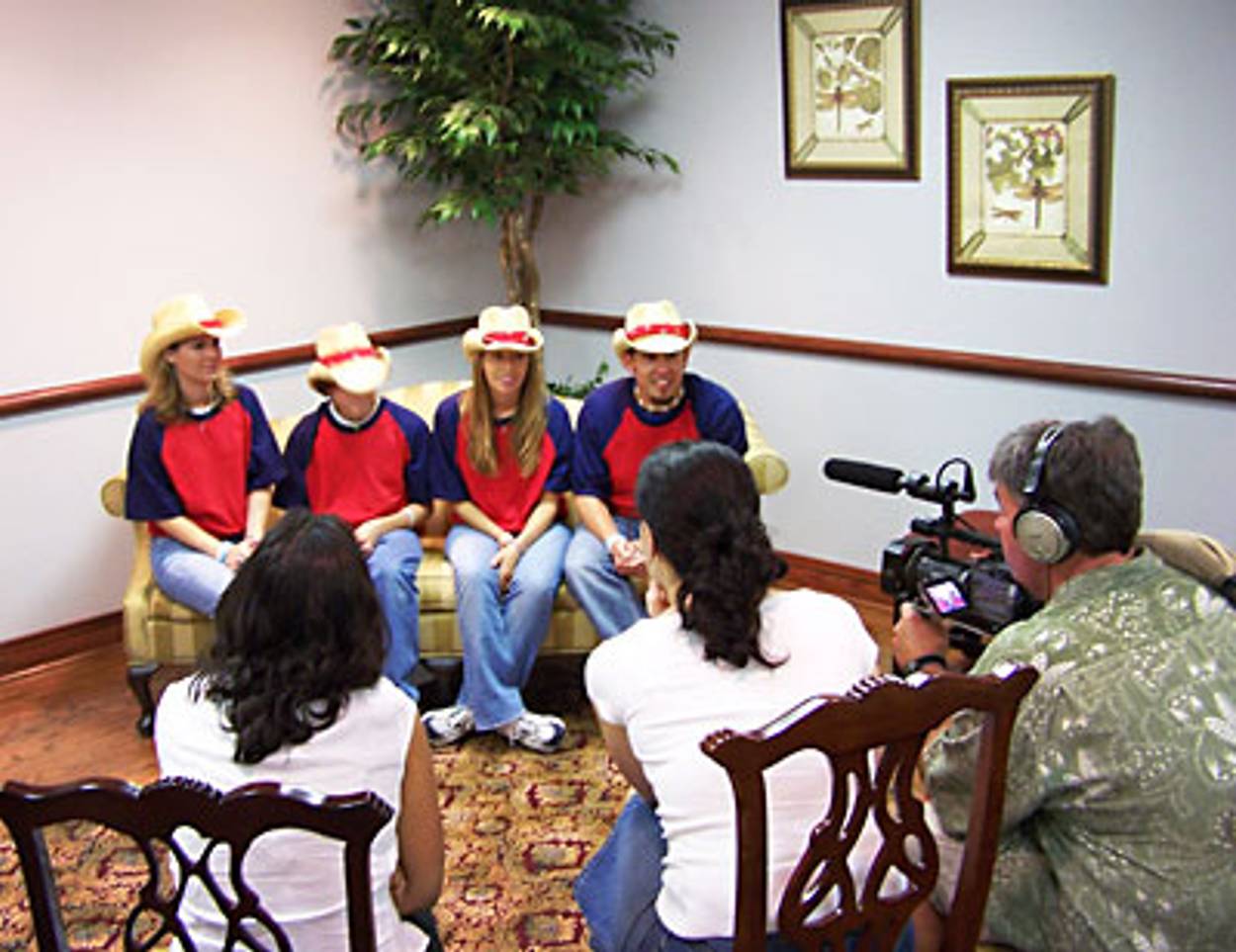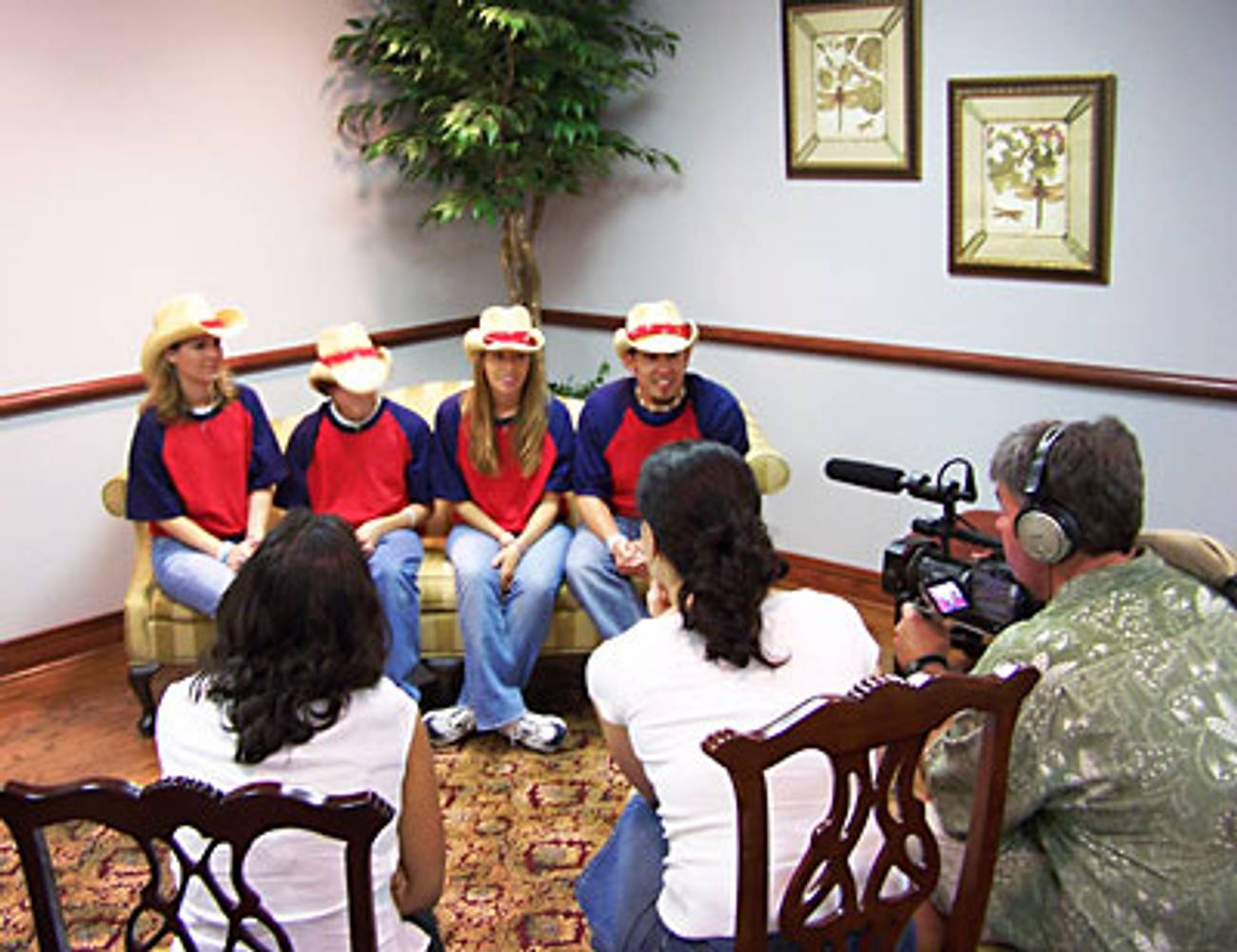Evangelicals Like Us
A documentary dares to examine fundamentalist Christians in a nuanced light




On the tree of wacky media subjects, evangelical Christians are usually seen as the lowest-hanging fruit. They have those mall-like megachurches, pimply teenagers signing pledges to guard their virginity, and hardcore bands that have kids moshing to songs about salvation, to say nothing of the Jesus coffee mugs, Jesus baby-T’s, Jesus messenger bags, Jesus picture frames, and Jesus mouse pads that help make up the $4 billion Christian merchandise industry. Their depiction is often as nuanced as a uniform block of gun-toting, abortion-hating, Jesus-loving, Bush-voting fascists.
But a pair of new filmmakers, Gerry Corneau and Leah Belsky, have taken a different path and simply thought to consider evangelicals as human beings. The fruit of their labor, Seeing Red, is a documentary for which the filmmakers traveled the country to ask evangelicals what drives their faith.
Corneau is a forty-eight-year-old father of two who lives in a small Rhode Island town near the Connecticut border. An industrial insulator by trade, he is a political progressive as well as a Christian spiritual seeker, although he long ago abandoned the Catholicism of his youth. After the 2004 election—regarded as proof of the country’s moral divide—he was dumbfounded.
“I couldn’t square that some big part of my country would vote for somebody based on values I had a really hard time conceiving,” he says in a phone interview.
Corneau batted around the idea of writing a book that explored the alleged moral divide, but eventually settled on making a documentary, although he had no experience in film. He met Leah Belsky through a posting he put up on an online bulletin board for women filmmakers; she was interested in exploring similar terrain.
Belsky, now twenty-six, was working at the World Bank in Washington after having graduated from Brown University. She had just a little more filmmaking experience than Corneau, with one documentary course under her belt. Like Corneau, she was perplexed after the 2004 election. Instead of casting judgments, Belsky wanted to understand who the Christian “values voters” credited with securing Bush’s presidency were.
“I have a strong Jewish identity,” she explains. “But to me, Judaism hasn’t been about faith and religion. It’s been about culture. Part of me was curious to see if, in spending time around these people who were more faithful, I would be able to relate a bit more.”
The unlikely team linked up and started traversing the fifty states with a video camera, interviewing dozens of people about their faith with the aim being to “present people from their own viewpoints,” according to Belsky. Nearly everyone they approached was eager to speak. They paid for the venture themselves, and added to their polyglot team associate producer Elon Green (another Jew) and assistant director Amrita Das (a Hindu).
Their finished product, Seeing Red, premiered in fall 2006. In the film, we meet megachurch congregants and Christian rock concertgoers, along with a handful of scholarly experts and, for good measure, a table of gay ex-Christians at a bar in Brooklyn. Perhaps the most striking thing about the film is that it casts an entirely nonjudgmental eye on its subjects, recognizing the humanity and dignity of all of them.
The film’s impartiality makes it a bit of a Rorschach test, and secularists who break out in hives at the mere mention of God, religion, or spirit will probably get twitchy over some of the subjects. But few interviewees evoke the caricature of right-wing Christians. Most are deeply reflective people who seem genuinely driven by love and kindness.
But where does their love and kindness take them? In some cases, it seems to have driven them where you might suspect. “The holy spirit led me to vote for George W. Bush,” declares one woman. There is a testimony of support for the war in Iraq, a vast church choir dressed in American flag regalia, a preacher who rides a sequined red-white-and-blue electric chariot up the church aisle to his pulpit. It’s a scene that even the most nonjudgmental among us probably can’t resist a little chuckle over.
But much of Seeing Red shows a more nuanced view of evangelicals, owing in some part to the filmmakers’ inclusion of themselves in the narrative. Corneau, for one, became “saved” during the making of the film, and is now a born-again Christian.
“Having been someone who in a past life made fun of evangelicals, I used to think you had to check your intellect at the door of a personal relationship with Jesus,” he says. But some of those they visited in making the film were Christian progressives, and those experiences affected Corneau profoundly. “Just because you have a deep relationship with the Lord doesn’t mean you’re going to be a Republican or a Christian conservative,” he said. “I’m as much if not more of a political progressive as I ever was.”
Belsky remained firmly Jewish, but describes becoming so comfortable around evangelicals—even when they evangelized to her—that she tried to get her adventurous grandmother in New York to accompany her to a local megachurch. “The evangelical communities we visited, if you look at the song and prayer, there’s something very attractive,” she says. “Not attractive in that I could relate to the faith in Jesus. But striking in terms of the community that these Christians have managed to create.”
Belsky and Corneau are now selling the finished film on their website, and encourage community groups to set up screenings and discussions, a method modeled after the grassroots promotional effort used by director Robert Greenwald for his films Outfoxed and Iraq for Sale. Last fall, CrossLeft, a national progressive Christian group, sponsored a series of community screenings of Seeing Red.
It’s all to the effect of imploring people to put on their very best pluralist caps and listen to voices they might disagree with. “The thing that Leah and I hoped for was that nonbelievers would watch it and at the end, not be so freaked out by believers,” says Corneau. In the end, Seeing Red lets its viewers do just that, by presenting—not demonizing—the people and values associated with the red states. One only hopes that there are a couple of filmmakers out there in Wyoming or Alabama working on their own project: Seeing Blue.
Jennifer Bleyer is a New York-based journalist who has written recently for the New York Times, Slate, Cosmopolitan, City Pages, and TheAtlantic.com. She tweets at @jennypencil.
Jennifer Bleyer is a New York-based psychotherapist and writer.